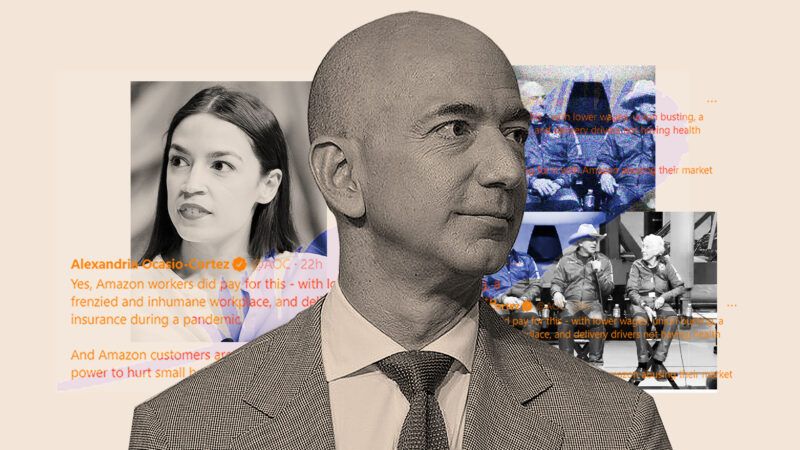AOC Says Amazon Abuses Market Power, Ignores Fact That Customers Shop at Amazon Because They Want To
After returning from space yesterday, Jeff Bezos thanked Amazon customers who made his fortune possible.

Just minutes after returning to the arid desert of Van Horn, Texas, from his first successful trip to space, former Amazon CEO Jeff Bezos thanked the millions of customers and employees who enabled him to grow a business so successful that he became a billionaire and self-funded his trip to space.
But since life here on Earth is plagued by tiresome partisan point-scoring, Bezos' moment of gratitude could not go uncriticized. Rep. Alexandria Ocasio-Cortez (D–N.Y.) seized on the moment to criticize Amazon labor conditions and allege that Amazon is in some way "abusing their market power to hurt small business"—a bold claim that ignores the value reaped by consumers, and that has become the startlingly accepted consensus among both the mainstream and fringe left.
Yes, Amazon workers did pay for this - with lower wages, union busting, a frenzied and inhumane workplace, and delivery drivers not having health insurance during a pandemic.
And Amazon customers are paying for it with Amazon abusing their market power to hurt small business. https://t.co/7qMgpe8u0M
— Alexandria Ocasio-Cortez (@AOC) July 20, 2021
Ocasio-Cortez is wrong that Amazon—and by extension, Bezos—has profited primarily by abusing its market power or engaging in anti-competitive practices. Bezos is so wealthy because, over the better part of three decades, he built a company that could successfully deliver a wide array of consumer goods to customers in just a few days flat, serving 300 million people annually (with 150 million of those customers deciding Amazon's services are so valuable that they choose to pay for an annual Prime membership). Bezos and other Amazon executives built a company that could survive the dot-com bubble, the subprime mortgage crisis, and a pandemic.
The same people who see monopolies everywhere often misstate how much market share Amazon has, and what alternatives are still available to customers. Amazon has about 40.4 percent e-commerce retail market share. That's a healthy chunk, but consumers have other choices: Walmart's sales comprise 7.1 percent of total U.S. e-commerce retail; Target, Wish, and other big-box retailers also ship directly to consumers. More people choose Amazon over competitors because it has more stuff and its click-to-ship speeds are half that of its competitors.
Of course, customers always have the option of seeking out brick-and-mortar retail equivalents—it's just that many of them choose not to, prioritizing convenience (and, in a pandemic, safety) over the fluorescent glory of in-person big-box shopping. But let's be clear about which businesses are losing money to Amazon. The company generates a lot of money from consumer electronics, which will make up about one-quarter of Amazon's total U.S. sales in 2021, and apparel/accessories, which will make up 16 percent. Those looking to buy consumer electronics would not otherwise frequent "mom-and-pop" stores, but rather big-box incumbents like Best Buy, recently departed Fry's Electronics, and fellow e-commerce hubs Alibaba and Apple.
"Amazon has clearly been a boon for users in terms of the consumer surplus it generates and the antitrust accusations against it are the sorts of things thrown at all the innovative market leading retailers through history," Cato's Ryan Bourne tells Reason.
These sorts of antitrust sentiments have been thrown around not just by far-left politicians like Ocasio-Cortez, but also Biden administration picks like economic adviser Tim Wu and Federal Trade Commission chair Lina Khan, who "see antitrust as an all-purpose tool for reining in perceived corporate malfeasance and correcting marketplace outcomes they don't like," wrote Elizabeth Nolan Brown in Reason's July issue.
"The idea that consumers choose to use products not because they're useful but because Big Tech companies have somehow tricked or pressured them into it is deeply embedded…in the new antitrust crusade more generally," she writes. "It's a form of consumer false consciousness in which end users don't know what they want (but members of Congress, of course, do)."
Of course, part of Ocasio-Cortez's criticism is fair: Amazon warehouse working conditions are sometimes quite bad, with employees getting so little time for breaks that they cannot use the restroom or take time off-task. Amazon workers have been denied pregnancy accommodations and adequate sick leave, and warehouses have been hit hard by the pandemic. However, her claims that Amazon engages in union-busting are unfounded (warehouse workers in Alabama actually voted against unionization), and the criticisms she leveled at Bezos yesterday have been par for the course for someone who calls Amazon's lower-skilled jobs "scams" while rabblerousing for the cause of wealth redistribution. What's more, Bezos has acknowledged reports about warehouse working conditions and has pledged to make changes.
Over the course of the pandemic, Bezos' net worth has increased by about $70 billion. But despite Ocasio-Cortez's objections, his vast increase in wealth has been the result of making millions of people better off.


Show Comments (329)